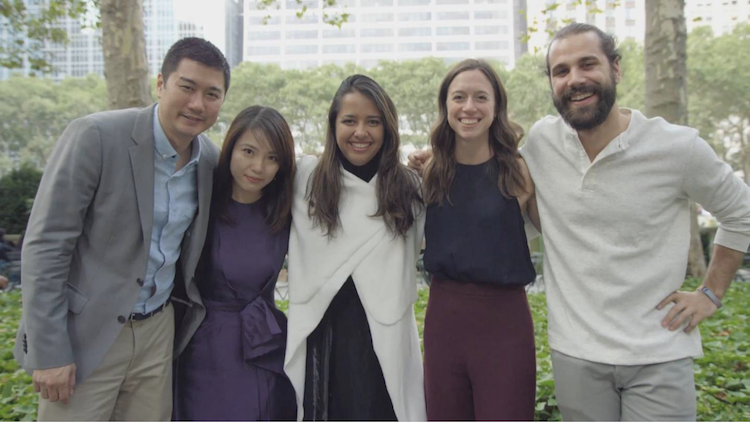Can the boom in cryptocurrencies help achieve inclusive, cooperative growth? That's what Moeda, a cooperative crypto-credit banking platform seeks to accomplish.
The group's well on its way. It recently concluded an initial coin offering in August of this year that raised $20 million dollars. The next step — launching a full product and beginning the process of bringing innovative, digital financial opportunities to the estimated 2.5 billion unbanked around the world.
"Moeda provides a transparent impact investment platform to impact investors and a banking-as-a-service platform to entrepreneurs who will be receiving loans to not only fund, but to scale and grow their businesses," Taynaah Reis, CEO of Moeda, says. "In turn, their local communities will directly benefit."
This year, we’ve seen Mutual Aid in Motion.
From scaling sharing hubs to Mutual Aid 101 trainings, we’re helping communities build the tools they need.
Every dollar fuels lasting resilience – proving that when we move together, we all move forward.
The funding will be used for initial seed projects and to setup the cooperative banking system. At least $10 million is earmarked towards providing micro-loans and credit services through partner cooperatives and banks. Moeda aims to scale through the use of the blockchain, the same distributed ledger technology that underpins Bitcoin and Ethereum. Blockchain will power Moeda's forthcoming platform and connect ethical investors with grassroots-based cooperatives and local sustainable projects around the world. Moeda's model also aims to help fulfill several of the United Nations' Sustainable Development Goals (SDGs). Financial inclusion has been accepted as a prerequisite to the goals of ending extreme poverty, gender equality, and eliminating hunger. Addressing social challenges is at the heart of Moeda, as the original idea for the project originated at a United Nations Blockchain for SGDs Hackathon that took place earlier this year.
"Through the Moeda platform, investors, and fund managers will gain access to SDG-aligned lending opportunities," Reis says.
The fact that Moeda is focused on cooperatives means that the bulk of its work will be through cooperative partners, making it far more democratic and less speculative than other blockchain-based cryptocurrencies. This has benefits for cooperatives too, as Moeda can address a key challenge. Currently, a number of cooperative banks and financial institutions in developing countries are often small and are often located in rural areas. Many lack the capacity to develop complex products like major banks. Moeda's platform, when released, will allow them to provide new products to existing and potential customers at a far lower cost.
"Financial credit is often completely inaccessible to large swaths of the population," Reis says. "Through the usage of Moeda's digital currency… these previously unbanked entrepreneurs will have legal, trustworthy, transparent means of conducting financial transactions."
One of the first partners for Moeda is Unicafes, a network of agricultural cooperatives in Brazil, who are excited about the opportunity to expand what they can offer their members. "Our cooperative institutions… they all have the wish of working together with Moeda to transform the life of those families and generate new opportunities [so they] can access small resources and be able to actually generate and promote the family economy," Vanderley Ziger, president of Unicafes, says.
Partnering with Unicafes means that Moeda can immediately begin working with 170 Brazilian Cooperative Credit Banks and 128 Communitarian Banks, which in total have a customer based of 100,000, mostly small family farmers. This will give them a deep reach into the rural regions, where the bulk of the unbanked reside,bringing more opportunities to cooperative entrepreneurs.
"The cooperative agriculture model is inherently more sustainable, and allows Moeda to tap into an already established community of local entrepreneurs," Reis says. Other partners include Green Cross Brazil, Creson, and Confesol.
While the initial launch will be in Brazil, Moeda is incorporated in Uruguay, but it really is an international project run by an global team, with staff and advisors hailing from China, South Korea, Denmark, and the United States. This, they believe, will allow them to quickly expand to meet demands for underserved around the world, based on what works — and does not work — in Brazil.
Soon users will be able to utilize the Moeda app, which will be launched early next year and will be designed to be simple — even for those with no knowledge of cryptocurrency, Reis says. Moreover, Moeda plans to invest in over 100,000 micro-loans to vetted entrepreneurs working primarily on cooperative agriculture projects.
With all the attention that initial coin offerings and blockchain are getting, Moeda serves as a reminder that it is not all about speculation and profit making. If designed properly, technology can address social needs and provide valuable services to those who need it. Furthermore, existing cooperatives can play a meaningful role.
Header image of Moeda founders (left to right): CTO Brad Chun, Director of Crypto Market Isa Yu, CEO Taynaah Reis, Product Lead Athena Diaconis, Chief Design Officer Alex Todaro, courtesy of Moeda

